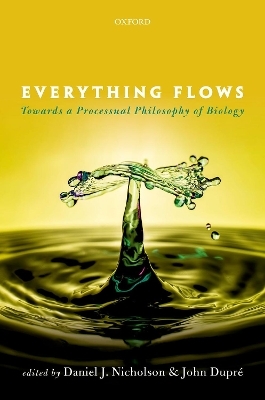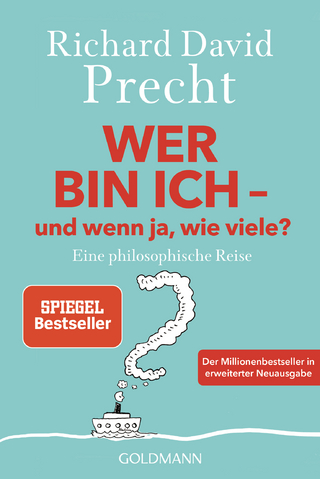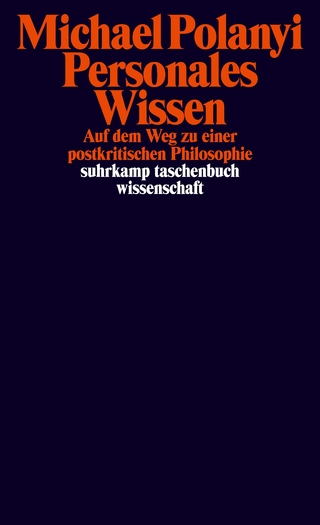
Everything Flows
Oxford University Press (Verlag)
978-0-19-877963-6 (ISBN)
This is an open access title available under the terms of a CC BY-NC-ND 4.0 International licence. It is free to read at Oxford Scholarship Online and offered as a free PDF download from OUP and selected open access locations.
Everything Flows explores the metaphysical thesis that the living world is not made up of substantial particles or things, as has often been supposed, but is rather constituted by processes. The biological domain is organised as an interdependent hierarchy of processes, which are stabilized and actively maintained at different timescales. Even entities that intuitively appear to be paradigms of things, such as organisms, are actually better understood as processes. Unlike previous attempts to articulate processual views of biology, which have tended to use Alfred North Whitehead's panpsychist metaphysics as a foundation, this book takes a naturalistic approach to metaphysics. It submits that the main motivations for replacing an ontology of substances with one of processes are to be found in the empirical findings of science. Biology provides compelling reasons for thinking that the living realm is fundamentally dynamic, and that the existence of things is always conditional on the existence of processes. The phenomenon of life cries out for theories that prioritise processes over things, and it suggests that the central explanandum of biology is not change but rather stability, or more precisely, stability attained through constant change. This edited volume brings together philosophers of science and metaphysicians interested in exploring the prospects of a processual philosophy of biology. The contributors draw on an extremely wide range of biological case studies, and employ a process perspective to cast new light on a number of traditional philosophical problems, such as identity, persistence, and individuality.
Daniel J. Nicholson is a research fellow currently based at Egenis, The Centre for the Study of Life Sciences, at the University of Exeter. Previously, he held appointments at the Cohn Institute for the History and Philosophy of Science and Ideas in Tel Aviv, as well as at the Konrard Lorenz Institute for Evolution and Cognition Research near Vienna. His work is characterized by an integrated and strongly interdisciplinary approach to the history and philosophy of biology, with a specific interest in the ontology of living systems and the adequacy of mechanistic explanations to make sense of them. He is also interested in general topics in the philosophy of science and in theoretical biology, broadly construed. John Dupré is Professor of Philosophy and Director of Egenis, The Centre for the Study of Life Sciences, at the University of Exeter. He has formerly held posts at Oxford, Birkbeck College, London, and Stanford, and visiting chairs at the University of Amsterdam and Cambridge. He has wide-ranging interests in the philosophy of biology, the philosophy of science generally, and naturalistic, empirically grounded metaphysics. He is a former president of the British Society for Philosophy of Science, and a Fellow of the American Association for the Advancement of Science.
Johannes Jaeger: Foreword
Part I: Introduction
1: John Dupré & Daniel J. Nicholson: A Manifesto for a Processual Philosophy of Biology
Part II: Metaphysics
2: Peter Simons: Processes and Precipitates
3: Rani Lill Anjum & Stephen Mumford: Dispositionalism: A Dynamic Theory of Causation
4: James DiFrisco: Biological Processes: Criteria of Identity and Persistence
5: Thomas Pradeu: Genidentity and Biological Processes
6: Johanna Seibt: Ontological Tools for the Process Turn in Biology: Some Basic Notions of General Process Theory
Part III: Organisms
7: Daniel J. Nicholson: Reconceptualizing the Organism: From Complex Machine to Flowing Stream
8: Denis Walsh: Objectcy and Agency: Towards a Methodological Vitalism
9: Frédéric Bouchard: Symbiosis, Transient Biological Individuality, and Evolutionary Processes
10: Argyris Arnellos: From Organizations of Processes to Organisms and Other Biological Individuals
Part IV: Development and Evolution
11: Paul Griffiths & Karola Stotz: Developmental Systems Theory as a Process Theory
12: Flavia Fabris: Waddington's Processual Epigenetics and the Debate over Cryptic Variability
13: Laura Nuño de la Rosa: Capturing Processes: The Interplay of Modelling Strategies and Conceptual Understanding in Developmental Biology
14: Eric Bapteste & Gemma Anderson: Intersecting Processes are Necessary Explanantia for Evolutionary Biology, but Challenge Retrodiction
Part IV: Implications and Applications
15: Stephan Guttinger: A Process Ontology for Macromolecular Biology
16: Marta Bertolaso & John Dupré: A Processual Perspective on Cancer
17: Ann-Sophie Barwich: Measuring the World: Olfaction as a Process Model of Perception
18: Anne Sophie Meincke: Persons as Biological Processes: A Bio-Processual Way Out of the Personal Identity Dilemma
| Erscheinungsdatum | 11.06.2018 |
|---|---|
| Verlagsort | Oxford |
| Sprache | englisch |
| Maße | 163 x 241 mm |
| Gewicht | 842 g |
| Themenwelt | Geisteswissenschaften ► Philosophie ► Metaphysik / Ontologie |
| Naturwissenschaften ► Biologie | |
| ISBN-10 | 0-19-877963-1 / 0198779631 |
| ISBN-13 | 978-0-19-877963-6 / 9780198779636 |
| Zustand | Neuware |
| Informationen gemäß Produktsicherheitsverordnung (GPSR) | |
| Haben Sie eine Frage zum Produkt? |
aus dem Bereich


